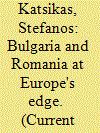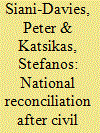|
|
|
Sort Order |
|
|
|
Items / Page
|
|
|
|
|
|
|
| Srl | Item |
| 1 |
ID:
129210


|
|
|
|
|
| Publication |
2014.
|
| Summary/Abstract |
Bulgaria and Romania joined the European Union as full member states on January 1, 2007. This momentous event was the culmination of a long and demanding political project that has often been described as "Europeanization." Although the foundations of this project were laid fairly soon after the fall of both countries' communist regimes in 1989, the pace was slow, and did not really gain momentum
until the end of the 1990s. Over the years the project ebbed and flowed, but what kept both nations committed was their strong belief that joining the EU would fill the political, economic, and security vacuum that the dissolution of the communist bloc had produced. EU membership was popularly seen as a panacea that would allow Bulgaria and Romania to stabilize their newborn democratic systems and overcome the economic problems of the postcommunist transition. It offered confirmation that the Bulgarians and Romanians were really Europeans. Seven years later, however, rather than feeling pulled into the heart of Europe, Bulgaria and Romania find themselves at the edge. Their EU partners raise questions about their commitment to the rule of law and their willingness to crack down on organized crime and illegal immigration. Does this mean that membership has not been an easy route to democratic stability, economic growth, and greater opportunity for all? European integration may be a difficult topic at a time when economic crisis has, for some, cast the entire effort into doubt. But the situation of Romania and Bulgaria lends itself to reflection on the wider project and its overall historical importance.
|
|
|
|
|
|
|
|
|
|
|
|
|
|
|
|
| 2 |
ID:
090140


|
|
|
|
|
| Publication |
2009.
|
| Summary/Abstract |
This article discusses post-conflict reconciliation in Greece following the divisive civil war of the 1940s. Focusing on the elite political discourse and the relationship between reconciliation and democratization, its chief argument is that in Greece continuing disagreement about the civil war did not inhibit a process of reconciliation because it was voiced within a normative framework in which violence had been repudiated as a political tool. Particularly since the fall of the Colonels' dictatorship in 1974, reconciliation has been linked to a number of distinct political projects, some of which were as divisive as conciliatory in their effect. In each case, reconciliation meant different things to differing shades of political opinion, but the widespread adoption of the term by both the governing and opposition elites, as well as society as a whole, gradually entrapped politicians of all persuasions into accepting that a process of reconciliation had occurred. Reconciliation in Greece has therefore rested not on the establishment of a single agreed narrative representing the truth about the past, but rather on the righting of perceived injustices and the free articulation of differing interpretations of that past by both left and right within a democratic environment.
|
|
|
|
|
|
|
|
|
|
|
|
|
|
|
|
|
|
|
|
|